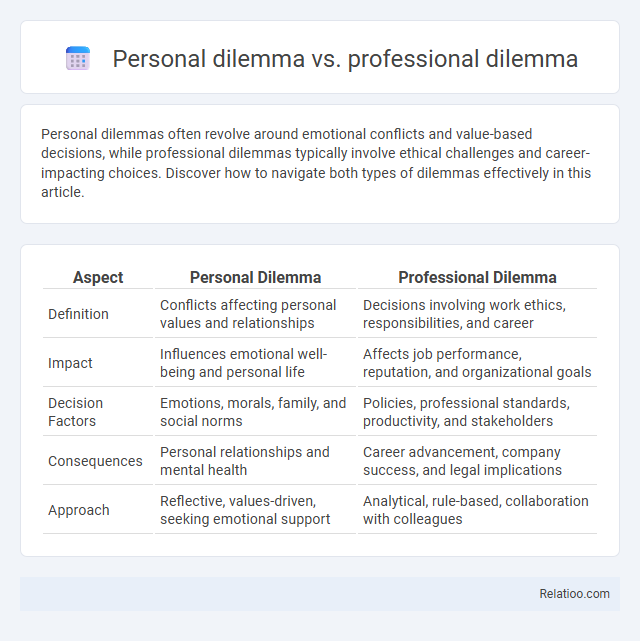Personal dilemmas often revolve around emotional conflicts and value-based decisions, while professional dilemmas typically involve ethical challenges and career-impacting choices. Discover how to navigate both types of dilemmas effectively in this article.
Table of Comparison
| Aspect | Personal Dilemma | Professional Dilemma |
|---|---|---|
| Definition | Conflicts affecting personal values and relationships | Decisions involving work ethics, responsibilities, and career |
| Impact | Influences emotional well-being and personal life | Affects job performance, reputation, and organizational goals |
| Decision Factors | Emotions, morals, family, and social norms | Policies, professional standards, productivity, and stakeholders |
| Consequences | Personal relationships and mental health | Career advancement, company success, and legal implications |
| Approach | Reflective, values-driven, seeking emotional support | Analytical, rule-based, collaboration with colleagues |
Understanding Personal vs Professional Dilemmas
Personal dilemmas often involve conflicting values or emotions tied to your relationships and individual identity, while professional dilemmas center around ethical decisions, workplace responsibilities, and career goals. Understanding the distinction between personal and professional dilemmas helps you navigate challenges by applying context-specific strategies that align with your personal integrity or organizational standards. Recognizing these differences enhances your decision-making skills and promotes balanced resolutions in both aspects of life.
Key Differences Between Personal and Professional Dilemmas
Personal dilemmas involve decisions that affect your private life, emotions, and relationships, while professional dilemmas center on work-related challenges, ethical conflicts, and organizational goals. The key differences lie in the context and consequences: personal dilemmas impact your well-being and close connections, whereas professional dilemmas influence career progression, workplace dynamics, and reputation. Understanding these distinctions helps you navigate each dilemma effectively by addressing the relevant priorities and stakeholders.
Common Examples of Personal Dilemmas
Common examples of personal dilemmas include choosing between career advancement and family time, deciding whether to relocate for a partner's job, or managing conflicts between personal values and social expectations. These situations often involve emotional stakes and require balancing individual desires with relationships or moral integrity. Unlike professional dilemmas, which revolve around workplace ethics and decisions, personal dilemmas focus on deeply personal choices impacting an individual's private life.
Common Examples of Professional Dilemmas
Professional dilemmas often involve conflicts between organizational policies, ethical responsibilities, and personal values, such as whistleblowing on misconduct, balancing confidentiality with transparency, or managing resource allocation under budget constraints. Common examples include deciding whether to report a colleague's unethical behavior, prioritizing client needs against company goals, and handling conflicts of interest in decision-making processes. These challenges require critical thinking and adherence to professional codes of conduct to navigate effectively.
Ethical Considerations in Personal and Professional Contexts
Ethical considerations in personal dilemmas revolve around individual values, moral beliefs, and the impact on close relationships, while professional dilemmas require adherence to organizational codes, industry regulations, and the balancing of stakeholder interests. Your ability to navigate these dilemmas depends on understanding the nuanced differences between personal integrity and professional responsibility. Recognizing these distinctions ensures that ethical decisions align with both personal conscience and professional standards.
The Impact of Dilemmas on Decision Making
Dilemmas, whether personal or professional, significantly influence decision-making processes by introducing conflicting values and uncertain outcomes that challenge an individual's priorities. Personal dilemmas often involve emotional and ethical considerations that affect relationships and self-identity, while professional dilemmas primarily revolve around organizational goals, ethics, and stakeholder consequences. Understanding the specific nature of these dilemmas enhances decision-making strategies by promoting critical analysis, ethical reasoning, and balanced judgment in complex situations.
Navigating Conflicts of Interest
Navigating conflicts of interest requires distinguishing between personal dilemmas, which involve an individual's values and relationships, and professional dilemmas, centered on organizational goals and ethical standards. Understanding the nuances of dilemma types allows for clearer conflict resolution strategies, ensuring integrity and fairness in decision-making processes. Effective management of these dilemmas safeguards trust, enhances accountability, and aligns actions with both personal ethics and professional obligations.
Strategies for Resolving Personal Dilemmas
Personal dilemmas often involve conflicting values or emotions, requiring introspection and prioritization of individual well-being to resolve effectively. Strategies such as seeking advice from trusted friends, practicing mindfulness to clarify thoughts, and weighing long-term consequences help navigate personal uncertainties. Unlike professional dilemmas, which rely more on organizational policies and stakeholder interests, resolving personal dilemmas demands a tailored approach centered on self-awareness and emotional balance.
Approaches to Managing Professional Dilemmas
Professional dilemmas often require structured decision-making frameworks such as ethical guidelines, stakeholder analysis, and risk assessment to balance conflicting interests effectively. Unlike personal dilemmas that rely more on individual values and emotions, managing your professional dilemmas involves leveraging organizational policies and seeking advice from mentors or ethics committees to ensure accountability and transparency. Approaching your professional dilemmas with a clear, methodical strategy enhances problem-solving and sustains workplace integrity.
Balancing Personal Values and Professional Responsibilities
Balancing personal values and professional responsibilities often places you at the crossroads of a personal dilemma and a professional dilemma, where ethical standards and emotional commitments may conflict. Navigating these challenges requires a clear understanding of your core beliefs alongside organizational expectations, ensuring decisions align with both integrity and accountability. Addressing such dilemmas involves weighing the impact on your reputation, workplace harmony, and personal well-being to find a resolution that honors both spheres effectively.

Infographic: Personal dilemma vs Professional dilemma
 relatioo.com
relatioo.com